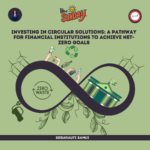- Home
- ArthNivesh
- Finance Forum
- Samnidhy
- TJEF
- Finance Lab
Top Insights
Volume 3, Issue 3
Editorial
In the last few months, the world had experienced various geopolitical issues which has a direct impact on the global GDP and growth rate. International Monetary Fund projected the global growth rate at 3.5% in 2019 and 3.6% in 2020, 0.2% and 0.1% less than earlier predictions. While the growth rate is close to post-crisis highs, the global growth rate is expected to see a downfall. China’s slowdown will be quicker than expected if trade tensions will prevail. The Brexit and sovereign risks in Italy pose a threat to Europe. US Federal government frequent shutdown will only add to the risk of a global slowdown.
In the midst of all these, the climate itself is posing a challenge to the human race. By 2100, climate change will lead to a 92% fall in the per capita GDP of India than without climate change as per Burke, Hsiang, and Miguel. In the coming times, climate change will have a drastic effect on the global economy.
India is also highly vulnerable to such global headwinds. Hence, in this third issue of the third volume of TAPMI Journal of Economics & Finance, we have tried to delve deeper into the impact of climate change on the Indian economy. While politics and economy are always intertwined, we felt it’s good to explore this. We tried to analyze the consequence of the latest budget presented by the ruling government on upcoming polls. The top management of the companies has an impact on the growth and how their sudden change can affect future growth prospects.
TJEF has always tried to narrate the stories that facts and scenarios don’t by themselves. I would like to appreciate the sincere efforts put by all the students to write for us. We are publishing a few of the research papers in this edition of the journal. Happy Reading!
Prasun Banerjee
Managing Editor, TJEF
Please Click here to Read the edition
Recent Posts
Categories
Categories
- ArthNivesh24
- ArthNivesh | Events6
- ArthNivesh | Newsletter30
- Blog256
- Budget 20188
- Budget 20196
- Budget 20203
- Budget 20216
- Budget 20237
- Finance Forum4
- Finance Forum | M&A2
- Finance Forum | M&A3
- Manthan3
- Samnidhy64
- Samnidhy | Company Analysis40
- Samnidhy | Weekly Newsletters66
- Sunday Articles41
- Thoughtful Tuesdays24
- TJEF48
- TJEF Journals22









